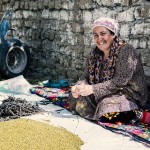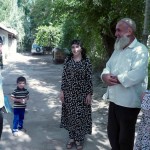Every week, Karimjon Roziqov, an imam in a mosque in Tajikistan’s mountainous Rasht district, looks forward to Friday. Residents in his community call him domullo, or “teacher,” and on Fridays, after the prayer service at his mosque, he sets aside 15 minutes to talk to them about tuberculosis (TB). In predominantly Muslim Tajikistan, mosques are an effective way to reach communities, especially those in remote areas where access to print and broadcast media is limited, with important public health messages.

Rajabmo Nazarova is one of many female farmers in the Khatlon province of southern Tajikistan who face difficulties feeding her large family. Although agriculture is the main industry in the region, undernutrition remains very high in Khatlon. In particular, children under 5 years old and women of reproductive age are most vulnerable to undernourishment. One in three children are stunted.
May 2017—Davlatoy Beknazarova and her family live in a small village in Tajikistan’s Khatlon province, where her sewing skills are setting her on the path to success as a businesswoman. After attending a brief training course on how women can become entrepreneurs, she put her talents to work for her.

March 2017—In 2012, Dr. Qudratullo Qodirov was one year out of medical school and had been offered a position as head of a tuberculosis (TB) center in the Rash district, some 200 kilometers from Tajikistan’s capital city of Dushanbe.
The five-year Local Governance Project in Tajikistan, which launched in 2012, is designed to help the country implement the Law on Local Self-Governance in Towns and Townships. The project partners with 20 jamoats (communes) in 10 districts across all four regions of Tajikistan to improve local governments’ delivery of services to citizens, particularly, clean drinking water.








Comment
Make a general inquiry or suggest an improvement.